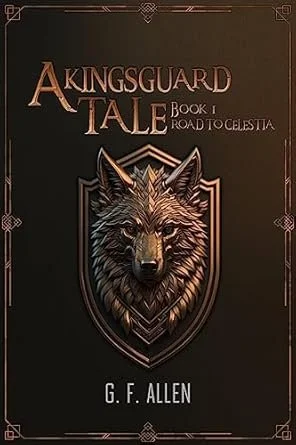Book Review: A Kingsguard Tale: Road to Celestia
G.F. Allen's debut novel, A Kingsguard Tale: Road to Celestia has all the elements you would expect of a sword and sorcery fanstasy epic. It is set in a political economy modeled loosely on medieval Europe. It has an unproven hero on a quest he doesn’t fully understand, a plucky potential love interest with whom he has a falling out, a team of quirky sidekicks to assist him, and a world where brute violence is insufficient for victory but must be supplemented by magic in order to win the day.
Without giving too much of the plot away, the main character is charged with the task of rescuing a girl of a preternatural race who is being pursued by an equally preternatural dark lord who wants to use her for his goal of world domination. He is accompanied by a team of quirky allies, some of whom perish, and others who rise to levels of heroism that save the quest when all hop is lost. If you love those kind of adventures, this work is for you.
The author executes it well. Particularly, some of his action scenes rise to the level of Tolkien describing Gandalf fighting the Barlog, but that does not imply it is the same. The magic system in this world is harder than in The Lord of the Rings.
The world, the world of Frea, is like our world. Is it our world? Guns exist, but are rarely used. Most fighting is done with melee weapons, sometimes infused with magic to compound their effectiveness. It seems people have forgotten how to build them. One of the hero’s companions is a robot; a machine that can no longer be built. It has run out of power and needs to be taken to a specialist to get it started; it is empowered by what they think is magic; they don’t know it’s electricity, if that is what powers her. Kreg, the magical substance that permeates this world, functions more like a battery than fairy dust. Where, or perhaps when, is Frea?
It is not cut and dry. The world of Frea is still fantastic; it’s connection to our reality is ambiguous. Several species of intelligent beings co-exist within it; the princess who needs saving is not human. If we were to pick a good analogy for this world, it would not be Tolkien’s Middle Earth, but rather Stephen King’s Mid-World. There seems to be a connection to our world, but it’s hard to pinpoint. Is it the distance future, the past, or on another planet? That’s why the world is preternatural, not supernatural. Clarke’s law applies; it is advanced technology that the characters can’t distinguish from magic, but for the readers, that distinction is not as clear.
The novel ends with the immediate threat neutralized, but the dark lord is still at large, and there is an intruder of some sort at the palace gate of the King of Gain Arbor, the hero’s country. Who he is or what he heralds is left unsaid. So it’s happy for now, but not happily ever after, and who knows what the author has in store for us in the continuing adventures of Dart Horowitz and his people. Whether this turns out to be straight fantasy, science fiction, or something in between remains to be seen but I look forward to reading the next installment when it comes.


